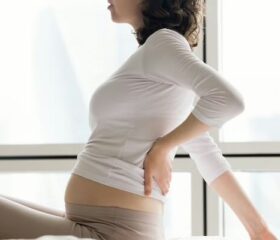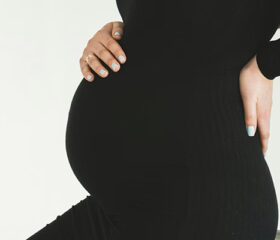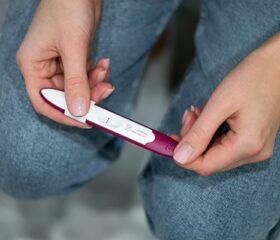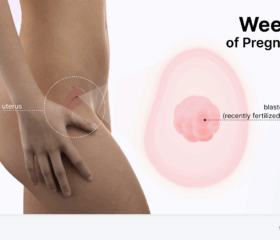Rib Pain During Pregnancy: Why It Happens and What to Do
While pregnancy can be a beautiful experience, it’s not without its share of discomforts, and sometimes, it can just plain hurt. You might get aches and pains in different parts of your body—including your ribs.
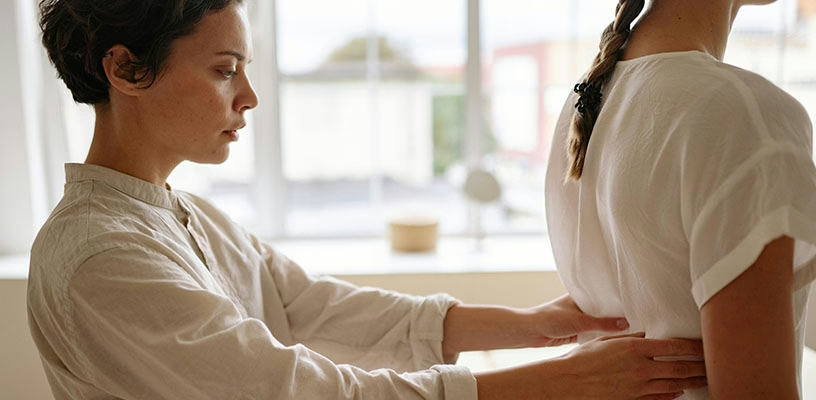
You’re not alone if your rib cage is twinging. Rib pain is a common complaint among pregnant women, and it’s usually nothing to worry about.
Let’s explore the reasons behind rib pain, what you can do to find relief, and when you should seek medical attention.
Is rib pain during pregnancy normal?
Unfortunately, yes—rib pain during pregnancy is normal and quite common. As your body changes to make room for your growing baby, your ribs may suffer a bit.
The good news is that while rib pain is uncomfortable, it’s typically not a sign of a serious problem. You should be aware of when rib pain might be the result of an underlying issue (more on that below), but most of the time, it’s nothing to stress over.
What causes rib pain during pregnancy?
Many factors can contribute to rib pain during pregnancy. The most common culprits include:
- Hormonal changes: Pregnancy hormones, particularly relaxin and progesterone, loosen your joints and ligaments. As a result, the bones in your rib cage may move around more easily, which can hurt or lead to minor injury. 1 2
- Expanding uterus: As your uterus grows, it will put pressure on your internal organs and ribs. 3
- Your baby’s position: Your baby might grow closer to your ribs as your pregnancy progresses; this can add to the pressure on them. He might also throw a few kicks and jabs here and there for good measure.
- Breast growth: Your breasts will probably grow somewhat larger. This often causes breast pain during pregnancy, and it can also put pressure on your ribs.
You may also catch yourself standing, walking, or sitting differently due to the changes in your body, all of which can strain your muscles. This most commonly leads to back pain, but it’s possible for rib pain to be one of its knock-on effects.
How will your rib pain change throughout your pregnancy?
Rib pain can surface at different stages of your pregnancy. Here’s a breakdown of how it may manifest during different trimesters.
First trimester
You may be glad to hear that rib pain is less common in the first trimester. That’s because it’s largely caused by your expanding body, and at this stage, your baby is still very small, so your body hasn’t had to undergo the degree of stretching and expansion that it will later on.
Second trimester
With your baby growing and your uterus expanding more, you may feel some rib pain and even shortness of breath, particularly towards the end of your second trimester.
You may also start experiencing heartburn at this stage of your pregnancy, which many experts believe is linked to your pregnancy hormones and expanding uterus. Heartburn can cause pain—first around your rib area, then moving up to your neck and throat. 4
Third trimester
Rib pain tends to be most noticeable during the third trimester, when your uterus is at its largest. This puts a lot of pressure on your ribs. As your baby grows bigger and stronger, he’ll also give more forceful kicks and movements.
Remember the heartburn we just mentioned? It might continue to bother you in this trimester, too.
The good news is that there’s a good chance your baby will drop into your pelvis in the weeks before delivery. This will relieve some of the pressure on your ribs. Of course, once you give birth and your body bounces back to its non-pregnant state, you’ll get rid of any rib pain once and for all.
How you can relieve rib pain at home
While there isn’t anything you can do to entirely avoid rib pain, there are plenty of things you can do to get at least a little relief. Try using:
- Loose clothing: Wearing tight clothing can add extra pressure to your ribs and exacerbate your pain, so it may be a sign that you should start wearing maternity clothes. Opt for comfortable, loose-fitting dresses, sweaters, and long tanks.
- Maternity belt: A maternity belt or band can lift and support your belly. It helps redistribute the weight and takes some pressure off your ribs.
- Supportive bra: If you think your breasts might be contributing to your rib pain, buy a well-fitting maternity bra that offers good support.
- Posture: Slouching can compress your ribs and worsen the pain. Straighten your spine and maintain good posture, especially when sitting. Consider seeing a pregnancy chiropractor who can guide you if you need.
- Warm or cold compresses: Apply a cold compress to the area if it feels inflamed, or a warm compress if it just feels tender.
- Warm showers or baths: In a similar vein, a warm bath is also a great way to ease your aches and pains.
- Gentle stretches: Do some yoga or light stretches that focus on your back and chest muscles to relieve tension and improve your comfort. An exercise ball can be useful for these stretches.
- Hydration and diet: Drinking enough water and maintaining a balanced pregnancy diet benefits your overall health and minimizes constipation, which sometimes can lead to rib pain.
- Over-the-counter pain relief: As a last resort, you could take a pain reliever and fever reducer. While you can usually take Tylenol (acetaminophen) and NyQuil when you’re pregnant, always check with your doctor before using any medication during pregnancy, including over-the-counter options.
Sleeping well can be a tricky task when you’re heavily pregnant and suffering from rib pain. If you have pregnancy insomnia, make sure you’re not falling asleep in one of the wrong sleeping positions for pregnancy (like flat on your back). Try side-sleeping instead, and consider getting a pregnancy pillow.
When to call your doctor about rib pain
To reiterate, most rib pain during pregnancy is normal. However, you should call your doctor if your pain is constant, severe, or interferes with your daily life. Occasionally, there may be underlying issues compounding it.
Let’s look at what to watch out for.
Preeclampsia
Preeclampsia is a condition that causes high blood pressure and potentially liver or kidney damage in pregnant and postpartum women. In addition to belly pain on the right side below the ribs, other symptoms include: 5
- Swelling on your hands and face
- Sudden weight gain
- Headaches
- Trouble breathing
- Nausea
- Less urination
- Faintness
- Vision changes
Many women who have preeclampsia deliver their babies without any problems and fully recover. However, it can lead to life-threatening complications, such as a brain injury or pulmonary edema (fluid on your lungs), if it’s not treated quickly. Let your doctor know immediately if you have any preeclampsia symptoms.
HELLP syndrome
HELLP syndrome is a variant of preeclampsia that causes hemolysis (your red blood cells breaking down), elevated liver enzymes, and low platelet count. One of the symptoms is pain in your upper right torso (near your ribs) or the middle of your abdomen.
In addition to rib pain, be aware of its other symptoms, which include: 6
- Fatigue
- Excess weight gain
- Headaches
- Nausea and vomiting that don’t ease up
- Blurry vision
- Nosebleeds
Although HELLP syndrome is a serious medical condition, it’s also relatively rare, occurring in just 1–2 out of 1,000 pregnancies. 6 Still, having any of these symptoms warrants a check-up from your doctor straight away.
Chronic cholecystitis
Pregnancy increases your risk of gallstones, which can lead to chronic cholecystitis—consistent swelling and discomfort of your gallbladder. This condition can cause pain in your upper right abdomen, which you may mistake for rib pain. 7
Pulmonary embolism
Having a pulmonary embolism (PE) means there’s a sudden blockage by a blood clot in your lung artery. It can cause permanent damage to your lungs and low oxygen in your blood and organs. If you have PE, you may feel sudden shortness of breath coupled with intense rib pain. 8
Urinary tract infection (UTI)
Pregnant women are one of the groups most commonly affected by urinary tract infections (UTIs), a condition when bacteria infect your urinary tract (which includes your bladder, urethra, and kidneys). Untreated UTIs can sometimes cause kidney infections that might feel like side rib pain. 9
If your pain is accompanied by other common UTI symptoms, like painful urination or chills, get yourself checked out.
Final thoughts
Rib pain is one of the less fun aspects of pregnancy. Fortunately, it usually isn’t debilitating, and there are many self-care strategies to help you minimize the pain. You also generally don’t have to worry about it developing into a serious medical condition.
If your pain becomes unbearable or you have other symptoms, let your doctor know right away. It’s always a good idea to get a professional’s opinion if you suspect something’s wrong. Otherwise, just hang in there, and look forward to when those pesky aches and pains ease up after pregnancy.
Article Sources
- University of Rochester Medical Center. "Back Pain in Pregnancy" Retrieved April 30, 2025.
- Lane Community College - Media Sites. "Pregnancy and movement disorders" Retrieved April 30, 2025.
- Tommy’s. "35 weeks pregnant: baby's development, sore ribs and sleeping on your side" Retrieved April 30, 2025.
- University of Rochester Medical Center. "Pregnancy and Heartburn" Retrieved April 30, 2025.
- MedlinePlus. "Preeclampsia" Retrieved April 30, 2025.
- MedlinePlus. "HELLP syndrome" Retrieved April 30, 2025.
- MedlinePlus. "Chronic cholecystitis" Retrieved April 30, 2025.
- MedlinePlus. "Pulmonary Embolism" Retrieved April 30, 2025.
- U.S. Centers for Disease Control and Prevention. "Urinary Tract Infection Basics" Retrieved April 30, 2025.
